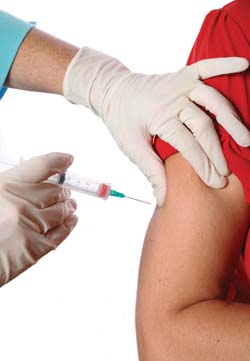
It's flu season again–running from late fall 2010 through early spring 2011. The best way to avoid catching the flu is by getting a flu vaccination each year. Here's what you need to know.
Influenza (the flu) is a contagious respiratory illness caused by influenza viruses. It spreads from person to person and can cause mild to severe illness; in some cases it can lead to death. Up to 20 percent of the American public gets the flu each year, and more than 200,000 people are hospitalized annually from flu-related complications, according to the Centers for Disease Control and Prevention (CDC). Deaths from flu-related causes average about 23,600 a year.
Although most healthy people recover from the flu without problems, certain groups of people are at high risk for serious complications. These include:
- people age 65 and older
- children younger than 2 years old
- people of any age who have chronic medical conditions, such as diabetes, asthma, congestive heart failure, or lung disease
"For the 2010–2011 flu season, the flu vaccine provides protection against the 2009 H1N1 pandemic virus, as well as two seasonal flu viruses."
Symptoms of the Flu
Symptoms for the seasonal flu and the 2009 H1N1 flu are similar. They include fever, cough, sore throat, body aches, headache, chills, and fatigue.
Facts About Vaccination
Flu vaccines have a very good safety record. Over the years, hundreds of millions of Americans have received seasonal flu vaccines.
For the 2010-2011 flu season, the flu vaccine provides protection against the 2009 H1N1 pandemic virus and two other flu viruses (an H3N2 virus and an influenza B virus) that research indicates will be most common during the upcoming season.
The viruses in the vaccine change each year based on international surveillance and scientists' estimates about which types and strains of viruses will circulate in a given year.
About two weeks after vaccination, antibodies that provide protection against influenza virus infection develop in the body.
Who Should Get Vaccinated for Flu?
- Everyone six months of age and older should get vaccinated against the flu as soon as possible.
- People at high risk of serious complications from the flu include children, pregnant women, people with chronic health conditions like asthma, diabetes or heart and lung disease and people 65 years and older.
When healthy people get vaccinated, they slow the spread of flu and protect people who are at high risk of serious complications from the flu.
The Two Types of Flu Vaccine
There are two types of vaccines:
- The flu shot — an inactivated vaccine (containing killed virus) that is given with a needle, usually in the arm. The flu shot is approved for use in people older than six months, including healthy people and people with chronic medical conditions.
- The nasal–spray flu vaccine —a vaccine made with live, weakened flu viruses that do not cause the flu (sometimes called LAIV for "live attenuated influenza vaccine" or FluMist). LAIV is approved for use in healthy people 2–49 years of age who are not pregnant.
